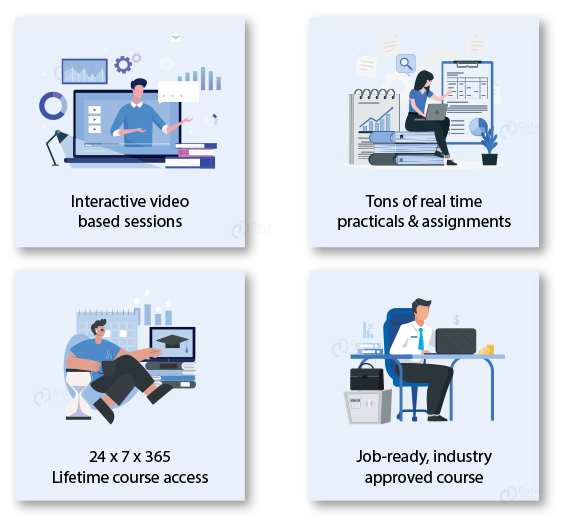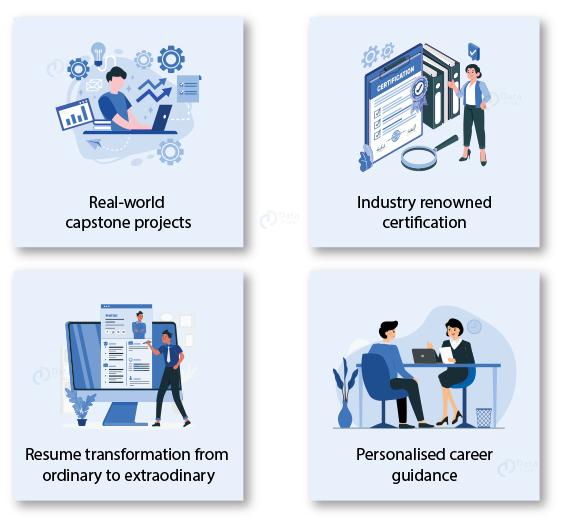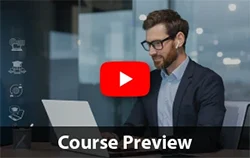Free OpenCV Certification Course – Learn Computer Vision with Python [Hindi]
- Self-paced video course
- 170+ hrs of study material, practicals, quizzes
- Acquire practical knowledge which industry needs
- Practical OpenCV course with real-time case-studies
- Lifetime access with industry renowned certification
Why should you enroll in this Free OpenCV course?
- Comprehensive curriculum covering both theoretical foundations and practical applications of computer vision
- Hands-on projects and exercises for practical experience and skill development
- Experienced instructors with industry expertise and a passion for teaching
- Interactive learning environment with quizzes and assessments to reinforce your understanding
- Enjoy the freedom to learn at your own pace and convenience
- Access to up-to-date course material and resources
- Certification upon successful completion to showcase your skills to employers
- Continuous support and guidance throughout your learning journey
- Connect and collaborate with peers and professionals
- Real-world examples and case studies to understand the practical relevance of computer vision
- Practical tips and insights for optimizing computer vision algorithms
- Open doors to exciting career opportunities in computer vision and related fields
OpenCV Course Objectives
- Develop a Solid Foundation: The primary objective of the OpenCV course is to provide participants with a solid foundation in computer vision principles and techniques. Through a combination of theoretical knowledge and hands-on exercises, learners will develop a deep understanding of fundamental concepts such as image processing, feature extraction, object detection, and more.
- By the end of this “OpenCV course, participants will have the necessary skills to analyze and interpret visual data using OpenCV.
- Master OpenCV Usage: Another key objective of the course is to enable participants to master the usage of OpenCV for image and video processing tasks. OpenCV is a powerful library that offers a vast array of algorithms and functions for computer vision applications. Participants will learn how to effectively utilize OpenCV’s capabilities to perform tasks such as image enhancement, edge detection, object tracking, and facial recognition. By working on real-world projects, learners will become proficient in implementing these techniques and harnessing the full potential of OpenCV.
- Build Practical Applications: This OpenCV course aims to empower participants to build practical computer vision applications using OpenCV. From developing augmented reality experiences to creating object detection systems, participants will gain hands-on experience in translating their knowledge into real-world projects. This OpenCV course curriculum includes guided projects and exercises that encourage learners to apply their skills and creativity to solve practical challenges. By the end of this OpenCV course, participants will have a portfolio of impressive projects that showcase their ability to implement computer vision solutions using OpenCV.
- Explore Advanced Topics: The OpenCV course also has the objective of introducing participants to advanced topics in computer vision. Through in-depth modules, participants will delve into areas such as deep learning for computer vision, 3D reconstruction, and optimization techniques. These advanced topics expand the horizons of participants knowledge and equip them with the skills to tackle complex computer vision problems. By exploring cutting-edge techniques and algorithms, learners will be prepared to handle the challenges of the rapidly evolving field of computer vision.
- Prepare for Further Advancement: Lastly, this OpenCV course aims to provide participants with a solid foundation for further advancement in computer vision. Whether participants plan to pursue advanced research, develop commercial applications, or seek career opportunities in computer vision, this OpenCV course equips them with the necessary skills and knowledge to excel. By acquiring a strong understanding of computer vision principles and mastering OpenCV, participants will be well-prepared to tackle more advanced concepts and pursue specialized areas within the field.
Overall, this OpenCV course objectives encompass building a strong foundation in computer vision, mastering OpenCV usage, developing practical applications, exploring advanced topics, and preparing participants for further advancement in the field. By achieving these objectives, participants will gain the confidence and expertise to excel in the exciting and rapidly growing field of computer vision.
Why should you learn OpenCV?
- “Computer vision has transformed industries like healthcare, autonomous vehicles, and robotics, empowering machines to perceive, comprehend, and interpret the visual world.” -Forbes
- “The demand for professionals skilled in computer vision is rapidly growing, with an increasing number of companies investing in this technology.” -TechCrunch
- “Mastering OpenCV opens up a world of opportunities for innovation, problem-solving, and research in computer vision.” -TechGig
- “Employers highly value computer vision skills, offering competitive salaries and promising career prospects.” -Indeed
What is OpenCV?
OpenCV (Open Source Computer Vision Library) is an open-source toolkit that offers a comprehensive set of tools, algorithms, and functions for tasks in computer vision and image processing. It is widely used in various industries and research fields due to its versatility, efficiency, and extensive community support. OpenCV was initially developed by Intel in 1999 and has since become a popular choice for computer vision applications worldwide. OpenCV offers a rich collection of functions that enable developers to perform a wide range of tasks such as image and video processing, object detection and tracking, facial recognition, augmented reality, and more. It provides a high-level interface that simplifies the implementation of complex computer vision algorithms, making it accessible to both beginners and experienced professionals. One of the key strengths of OpenCV is its cross-platform compatibility. It supports multiple programming languages such as C++, Python, Java, and MATLAB, enabling developers to choose the language that best suits their requirements.This makes OpenCV a versatile tool that can be seamlessly integrated into different software environments and platforms. Overall, OpenCV is a powerful and versatile library that empowers developers to create innovative computer vision applications. Its wide range of functionalities, cross-platform compatibility, and active community support make it a go-to choice for anyone working in the field of computer vision, from hobbyists and students to industry professionals and researchers.What to do before you begin?
Before embarking on the OpenCV course, it is helpful to have a basic understanding of programming concepts and some familiarity with Python. Having prior experience with Python programming will enable you to grasp the coding exercises and implement the algorithms more effectively. If you are new to Python, it is recommended to spend some time familiarizing yourself with the syntax, data types, control structures, and basic concepts of object-oriented programming. While prior knowledge of computer vision is not mandatory, having a basic understanding of image processing concepts will be beneficial. Familiarity with concepts such as image representation, pixel manipulation, and filtering will provide a solid foundation for learning computer vision principles and algorithms.Who should go for this free OpenCV course?
This OpenCV course is suitable for a wide range of individuals who are interested in expanding their knowledge and skills in computer vision and leveraging the power of OpenCV. Whether you are a beginner with no prior experience or an experienced professional looking to enhance your expertise, this training can benefit you. Here are some specific groups of individuals who can greatly benefit from this course:- Aspiring Data Scientists: If you aspire to become a data scientist specializing in computer vision, this training will provide you with a strong foundation in OpenCV, allowing you to work with image and video data, extract meaningful insights, and develop computer vision applications.
- Software Developers: Software developers looking to enhance their skills in computer vision can benefit from this training. OpenCV is widely used in various software applications, and understanding its capabilities will enable developers to integrate computer vision functionalities into their projects.
- Computer Vision Engineers: For professionals working in the field of computer vision, this training can serve as an opportunity to deepen their understanding of OpenCV and expand their expertise in developing advanced computer vision algorithms and systems.
- Students and Researchers: Students and researchers in computer science, engineering, or related fields can benefit from this training to gain practical experience and knowledge in computer vision using OpenCV. It can be valuable for academic projects, research endeavors, or pursuing further studies in the field.
- Entrepreneurs and Innovators: If you have innovative ideas for computer vision-based startups or products, this training will provide you with the necessary skills to transform your ideas into reality. You will learn to develop prototypes, implement computer vision algorithms, and create compelling applications using OpenCV.
By enrolling in our OpenCV course, you can expect the following benefits:
By enrolling in this OpenCV course, participants can expect to gain a multitude of benefits that will enhance their knowledge, skills, and career prospects in the field of computer vision. Here are some key advantages of this course program:- Comprehensive Learning Experience: The OpenCV course offers a comprehensive learning experience that covers both theoretical concepts and practical implementation of computer vision techniques using OpenCV. Participants will acquire a deep understanding of fundamental principles and gain hands-on experience through real-world projects, enabling them to become proficient in computer vision.
- Expert Guidance and Mentorship: Participants will receive guidance and mentorship from experienced instructors who are experts in the field of computer vision. They will have the opportunity to interact with industry professionals who will provide valuable insights, practical tips, and personalized feedback to help participants progress in their learning journey.
- Practical Hands-on Projects: Participants will engage in practical hands-on projects, applying their knowledge and skills to real-world scenarios. By working on these projects, participants will develop a portfolio of practical applications, showcasing their abilities to potential employers and clients.
- Industry-Relevant Curriculum: This OpenCV course curriculum is carefully designed to align with industry requirements and trends. Participants will learn the most in-demand computer vision techniques and tools, ensuring they are well-prepared to tackle real-world challenges and stay ahead in the rapidly evolving field of computer vision.
- Networking Opportunities: This OpenCV course provides participants with networking opportunities with fellow learners, industry professionals, and experts in the field. Through discussions, forums, and collaborative projects, participants can expand their professional network, exchange ideas, and foster valuable connections that can open doors to new opportunities.
- Career Advancement: Successful completion of the course will equip participants with a highly sought-after skill set in computer vision and OpenCV. This can significantly enhance their career prospects, opening doors to various job opportunities in robotics, healthcare, security, autonomous vehicles, and entertainment sectors.
- Stay Updated with Latest Trends: The field of computer vision is constantly evolving with new techniques, algorithms, and advancements. By enrolling in this OpenCV course, learners will stay up to date with the latest trends and advancements in computer vision, ensuring they remain at the forefront of the industry.
- Flexible Learning Environment: This OpenCV course offers a flexible learning environment, allowing participants to learn at their own pace and convenience. With access to online course materials, video lectures, and interactive exercises, participants can tailor their learning experience to fit their schedule and learning preferences.
- Hands-on Code Practice: Throughout this OpenCV course, participants will have ample opportunities to practice coding and implement computer vision algorithms using OpenCV. This hands-on experience will not only reinforce their understanding but also enhance their programming skills, making them more proficient in developing robust computer vision solutions.
- Certificate of Completion: Upon successful completion of this OpenCV course, participants will receive a certificate of achievement, which can be included in their professional portfolio as evidence of their expertise in computer vision and OpenCV.
Jobs after Learning this OpenCV Course
Completing this OpenCV course opens up a wide range of job opportunities in the field of computer vision and image processing. The knowledge and skills acquired through this training can pave the way for exciting career paths involving cutting-edge technologies and real-world problem-solving. Here are some potential job roles and career paths you can pursue after acquiring proficiency in OpenCV:- Computer Vision Engineer/Developer: As a computer vision engineer or developer, you will design and implement computer vision algorithms, develop image processing techniques, and work on projects involving object detection, recognition, tracking, and segmentation.
- Data Scientist (Computer Vision): Proficiency in OpenCV can lead to a rewarding career as a data scientist specializing in computer vision. You will work with large-scale image and video datasets, extract meaningful insights, develop machine learning models for image classification, and contribute to computer vision research.
- Machine Learning Engineer: OpenCV skills complement machine learning expertise, and you can work as a machine learning engineer, combining computer vision techniques with advanced machine learning algorithms to create intelligent systems capable of understanding visual data.
- Research Scientist: If you have a passion for exploring new frontiers in computer vision, you can pursue a career as a research scientist. You will work on cutting-edge projects, publish research papers, and contribute to advancements in the field of computer vision and image processing.
- Robotics Engineer: OpenCV is widely used in the field of robotics for tasks such as object detection, navigation, and gesture recognition. With OpenCV skills, you can work as a robotics engineer, designing and developing computer vision systems for autonomous robots.
- Augmented Reality (AR) Developer: AR is an emerging technology that blends the digital and physical worlds. OpenCV skills are valuable in AR development, as you can work on projects involving real-time object tracking, recognition, and overlaying virtual elements on the real-world environment.
- Surveillance and Security Engineer: OpenCV is extensively used in surveillance and security systems for activities such as face recognition, anomaly detection, and motion tracking. With OpenCV skills, you can work in this domain, designing and implementing computer vision-based security solutions.
- Automotive Vision Engineer: With the rise of autonomous vehicles, the demand for automotive vision engineers is growing. OpenCV skills are crucial for developing vision-based driver assistance systems, object detection algorithms, and traffic sign recognition systems.
- Image Processing Specialist: Applies image processing techniques to enhance, analyze, and manipulate images using OpenCV.
- Medical Imaging Specialist: Develops medical imaging software using OpenCV for diagnosis and analysis.
- Video Analytics Engineer: Implements OpenCV algorithms for video analysis and surveillance systems.
- AI Engineer: Integrates OpenCV with AI technologies to develop intelligent computer vision systems.
Our students are working in leading organizations

Online OpenCV Free Training Course Curriculum
- Overview of computer vision fundamentals
- Introduction to OpenCV and its capabilities
- Installing OpenCV and setting up the development environment
- Image representation and color spaces
- Image enhancement and filtering techniques
- Geometric transformations and perspective correction
- Feature detection and description
- Image segmentation and object recognition
- Optical flow and motion analysis
- Haar cascades and object detection using machine learning
- Tracking algorithms for moving objects
- Multi-object tracking and object counting
- Introduction to the principles of deep learning and convolutional neural networks (CNNs)
- Transfer learning for image classification
- Object detection using deep learning models
- Face recognition and emotion detection
- Augmented reality and virtual reality applications
- 3D reconstruction and stereo vision
- Performance optimization for real-time applications
- Parallelization and hardware acceleration
- Memory management and efficient data processing
Real-time OpenCV Projects:
- Pneumonia Diagnosis
- Student Attendance System
- Real-Time Fruit Detection
- Contour Lines Identification
- Objects Counter
Features of OpenCV Free Course


OpenCV Online Training FAQs
The OpenCV course is designed to provide you with a comprehensive understanding of computer vision concepts and practical hands-on experience using OpenCV, one of the most popular open-source libraries for computer vision and image processing. Whether you are a beginner or have some prior experience in computer vision, this course caters to learners of all levels, guiding you through the fundamentals and gradually delving into more advanced topics.
The course begins by introducing you to the basics of computer vision, including image representation, manipulation, and processing techniques. You will learn essential concepts such as image filtering, edge detection, and feature extraction. As you progress, you will dive deeper into topics like object detection, recognition, tracking, and motion analysis. Hands-on coding exercises and projects will help you reinforce your understanding and gain practical experience in implementing computer vision algorithms using OpenCV.
One of the key highlights of this course is its practical approach. You will work on real-world examples and projects, applying computer vision techniques to solve challenges commonly encountered in fields such as robotics, healthcare, surveillance, and augmented reality. Through guided exercises and projects, you will develop a strong foundation in OpenCV and gain the confidence to tackle complex computer vision problems.
The course is delivered by experienced instructors who are experts in the field of computer vision. They will provide clear explanations, detailed demonstrations, and valuable insights to help you grasp the concepts effectively. Additionally, the course materials include comprehensive documentation, code samples, and additional resources to support your learning journey.
By the end of this course, you will have a solid understanding of computer vision principles and the ability to leverage OpenCV to develop computer vision applications. Whether you aim to pursue a career in computer vision, enhance your existing skills, or explore the possibilities of computer vision in your domain, this course equips you with the knowledge and practical skills to achieve your goals.
This comprehensive OpenCV course equips participants with a diverse range of knowledge and practical skills in computer vision. The course is designed to equip learners with a deep understanding of computer vision principles and hands-on experience in using OpenCV for various image and video processing tasks. Here’s an overview of what participants will learn:
By the end of the course, participants will be equipped with a strong foundation in computer vision principles, a proficient skill set in using OpenCV, and the ability to develop practical applications in various domains. Graduates will be prepared to tackle real-world challenges and pursue further advancements in the field of computer vision.

